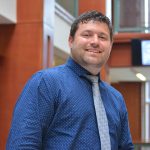Recently, two educational psychology projects in the Neag School of Education have received grants totaling almost $5 million to perform research in different areas of education for gifted and talented students. The grant, which was funded by the Jacob K. Javits Gifted and Talented Students Education Act, is helping provide money to two different professors and their research team.
In their recently published edited volume, Exploding the Castle: Rethinking How Video Games and Game Mechanics Can Shape the Future of Education (Information Age, 2017), Neag School faculty Michael Young and Stephen Slota — both longtime video game devotees — explore the value of games, the role of games in the future of K-12 and higher education, and more. Here, Young, associate professor of cognition, instruction, and learning technology, and Slota, assistant professor-in-residence of educational technology discuss the book and share their insights on the intersection between games, technology, and learning.
Mentors and guidance counselors helped Erik Hines, an assistant professor of educational psychology, find his path. Now he is paying it forward.
Congratulations to our Neag School alumni, faculty, staff, and students on their continued accomplishments inside and outside the classroom.
The U.S. Department of Education has awarded $1.3 million in funding through its Office of Special Education Programs (OSEP) to the Neag School’s special education program for a project that will fully fund five doctoral students in the areas of literacy, positive behavioral supports, and transition, with four-year competitive fellowships for each student.
Current Ph.D. student and two-time Neag School alumnus Kevin Liner ’10 (CLAS), (ED), ’11 MA is knee-deep in his doctoral studies, focusing his research interests on mathematics education.
The Neag School’s Department of Educational Leadership welcomes Kari B. Taylor as the new program director for Higher Education and Student Affairs (HESA). She begins her new appointment as the HESA program director and as an assistant professor-in-residence on July 31.
The National Science Foundation recently awarded an interdisciplinary group of UConn researchers $3 million for their project exploring the science of learning.
The Advanced Instructional Leadership Professional Diploma program was launched in May 2016 by the Queen Rania Teacher Academy in cooperation with the University of Jordan. This multiparty collaboration was developed and realized by the University of Connecticut, the Ministry of Education, and Global Affairs Canada.
Led by Erik Hines, assistant professor in the Department of Educational Psychology, students and faculty advisors from University of Connecticut’s ScHOLA2RS House traveled to the Bahia region of Brazil this spring to learn about the low access rate to higher education among Afro-Brazilian adolescents. Hines is the faculty advisor for the ScHOLA2RS House Learning Community.






